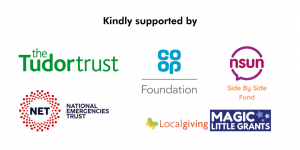In this blog, Shelley writes about her experience of loss as a child and as an adult. She shares how her experiences of grief have given her strength and resilience and a deeper appreciation of life and cherishing the special moments. Together, we’re talking through the taboos of loss and death. Get in touch to share your story.
I was three years old when I had my first heartbreak; it was when my Grandad passed away. I remember waking up one morning and my mother breaking the news, although I don’t remember what was said. I remember the funeral and my confusion as to why this was happening.
I didn’t know what death was
I remember running up to a man in the supermarket because I thought he was my Grandad. I remember the relief and excitement when I saw him, as I wrapped my tiny arms around his big protective legs. I remember the shame and the embarrassment when my mother gently pulled me away and told me he wasn’t my Grandad.
I was four years old when I had my second heartbreak, it was when my dad passed away. I remember him falling down the stairs a lot and then being in a wheelchair, and I remember when he had his bedroom moved to the living room. I remember the funeral, I remember my sister was crying and I thought I should too. I remember being confused as to why everyone was so sad.
I realised I would never see my dad again
I remember I spent years looking for my dad in the street, in the park, in the shop. I remember when I was fourteen, I was looking out of the car window for him, my sister had a flour filled balloon and it burst. I turned my attention away from looking for my dad and I looked at the burst balloon and what a mess it had made, flour all over the car seat. In that moment, I realised I would never see my dad again.
I finally knew what death was
When I was twenty-six my step-dad passed away suddenly, while I was with him. I tortured myself for a year with the belief that had someone else been with him, perhaps he would have lived. I convinced myself my family thought the same.
I was diagnosed with mild post-traumatic stress disorder and was offered counselling, but I found my own therapy in reading, running and meditation. The diagnosis helped me to understand why I was feeling the way I was and I found that educating myself about PTSD made me dissociate the disorder from a part of me, to a thing temporarily latched on to me.
It became an achievement to sleep in the dark and without waking from a nightmare. It’s an achievement when I recognise the crippling onset of an anxiety attack and gently reassure myself in order to control it. My coping mechanism is my faith, I have developed an absolute belief that when the body dies, the spirit lives on in some form or another. I believe loved ones send us lots of signs to show us they are OK.
Supporting children through bereavement
I think it’s so important that we teach children about death, they need to grieve as much as adults do. We should enable children the confidence to ask questions about their bereaved loved ones and give them honest answers. Children are incredibly resilient and more emotionally intelligent than some may realise. I believe it is better they are given the resources and support to grieve early into bereavement rather than to be left with years of confusion and fear.
As I mature into my late twenties I am grateful for my experiences of death, it has given me a resilience and a strength many people don’t have. I am more aware of the limited time we have on earth and the importance of cherishing every moment and every person we love in our lives. My recent trauma with my step-dad has taught me to be gentle and kind with myself, it has taught me to love myself more than I ever have.
Shelley
Enjoyed Shelley’s blog? Leave a comment below to let us know your thoughts. Have a story of your own to share? Email us to get in touch and share your advice.


